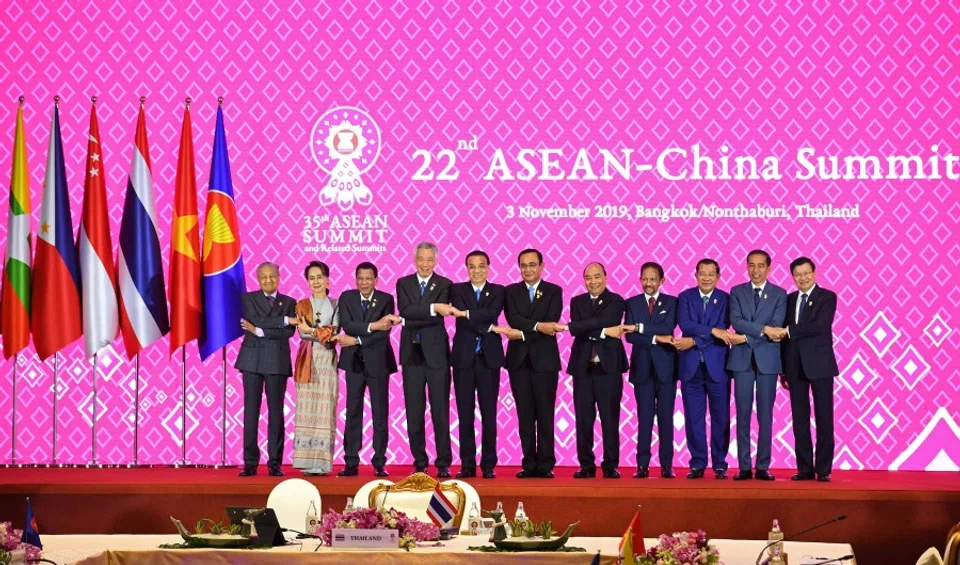BRI: Singapore and China should build third-party markets together
With their complementary strengths, China and Singapore can undertake Singapore-China projects that meet the needs of developing countries, says academic Gu Qingyang. Among other things, he suggests that the two countries can establish a third-party market cooperation and coordination mechanism to turn the BRI into a platform for win-win global collaboration.

We now find ourselves in a unique era.
Since the current American administration came to power, the world economy has undergone tremendous changes with broad, far-reaching implications. The international political and economic order that was established after the end of World War II has been altered. The global economy has been greatly impacted, and international trade has declined substantially. Those most noticeably affected by this shift are advanced economies including Singapore and other emerging export-oriented economies that rely heavily on international trade, finance, and investment.
The rise of trade protectionism, and multilateralism giving way to unilateral sanctions, have created unprecedented hurdles for economic globalisation. In an effort to generate new solutions for global collaboration, the Belt and Road Initiative (BRI) has made a constructive attempt to serve as a driving force for a new wave of globalisation.
But how can the BRI be turned into a platform for win-win global collaboration? How can the power of the market be introduced? And how can infrastructure construction be extended to encompass industrial development and urbanisation? All this will become the focal point of development in the next growth stage, where the implementation of the BRI needs to arrive at a new turning point. China's first attempt to cooperate with France in a third-party market came in 2015 and was concretised in 2019, marking a significant step forward in this direction.
Third-party market cooperation can effectively integrate China's production capacity, the advanced technology and management expertise of developed countries, and the development needs of developing countries. In this way, it can achieve "all-win" progress through the principle that "one plus one plus one is bigger than three".
Private enterprises and multinational corporations will have an opportunity to participate in BRI projects. They bring with them expertise in project governance and the backing of private funding sources.
Third-party market cooperation emphasises the importance of market principles. National sovereignty should be parked in the background, while enterprises conduct business collaborations based on market principles, in an effort to highlight the role of enterprises and markets as the main agents for international economic cooperation. This approach helps avoid international geopolitical strife and get the BRI back on track for promoting economic growth.

In the field of infrastructure construction, China has distinct strengths in capital and engineering capacity, but it is weak in areas such as project management, risk management, financing platforms, environmental protection, and cross-cultural management. Third-party market cooperation will allow China and enterprises from developed countries with considerable overseas experience to exercise their complementary advantages. It will also benefit local enterprises as participation in native projects will offer them the full play of advantages in the field.
This three-party synergy will reduce total investment cost and facilitate the acceptance of the project in both the local and international community. In this way, developing countries where BRI projects are carried out can have more autonomy in shaping the projects to better serve the needs of local development and livelihoods.
Such a cooperation platform in third-party markets is also conducive for avoiding vicious competition among countries competing in the same field or region, and encourage complementary cooperation between China and other countries in third-party markets. This is not confined to cooperation in infrastructure construction, but extends to industrial development and urban construction as well.
If Singaporean enterprises can make use of their advantages as the forerunners of internationalisation to jointly develop third-party markets with Chinese enterprises, it will create an immense leverage effect for Singapore enterprises, generating new development spaces for them to operate around the world.
Singaporean enterprises can play a unique role in working with Chinese counterparts to jointly develop the third-party market. In the past, the main form of business cooperation between the two countries was to invest in each other's territories. In the future, Singapore and China can work together to open up third-party markets, forming a new model of cooperation.
The enterprises in the two countries have distinct comparative advantages. Singaporean enterprises are highly internationalised and familiar with international rules, and they enjoy access to international channels and brands. On the other side, China has the most complete manufacturing system in the world, with strong construction capacity for large-scale projects, strong professional and technical personnel, and great learning potential.
Anticipating trade protectionism to be a long-term future challenge, Singapore's enterprises should be more active in going global than they have been before. The limitations of Singapore's domestic market make it difficult for its enterprises to rely on domestic business to grow bigger and stronger, which is an insurmountable disadvantage for its enterprises. If Singaporean enterprises can make use of their advantages as the forerunners of internationalisation to jointly develop third-party markets with Chinese enterprises, it will create an immense leverage effect for Singapore enterprises, generating new development spaces for them to operate around the world.
... Malay and Indian citizens constitute a considerable proportion of Singapore's population, which is an advantage that will help Singaporean and Chinese enterprises to jointly open up third-party markets in South Asian countries...
Singapore can first conduct third-party market cooperation with China in areas where it enjoys distinctive advantages, such as finance. The service industry and service trade are also Singapore's strengths and can be new areas of China-Singapore cooperation. Singapore enjoys advantages in legal services, patent services, urban planning, culture and education, skills training, design, and creative services. In addition, with its focus on financial and professional services, the service industry will play a vital role in the collaboration between Singapore and China in the coming years.
In infrastructure construction, Singapore can take advantage of its complete industrial chain which is compliant with international standards to enter third-party markets alongside Chinese enterprises. When infrastructure is improved, Singapore can give full play to its advantages in fields such as logistics, project management, tourism, real estate, medical service, developing smart cities and catering in meeting a wide range of urban development needs in third-party markets.

From a geographical perspective, ASEAN should be the first target for Singapore and China to launch third-party market cooperation. With its huge potential, ASEAN is expected to become one of the world's major economies. With Singapore being a member of ASEAN and China being its neighbour, the enterprises of these two countries share overlapping markets in the region.
In addition, Singapore has an edge with multi-ethnic and multicultural groups, since Malay and Indian citizens constitute a considerable proportion of its population, which is an advantage that will help Singaporean and Chinese enterprises to jointly open up third-party markets in South Asian countries such as India and Middle Eastern countries.
The two governments may also consider formulating project guidelines to guide enterprises, facilitate relevant feasibility studies, including industrial, regional, and national research, and promote successful cooperative model projects.
The governments and Chambers of Commerce of both Singapore and China should play an active role in driving third-party market cooperation between the two countries to create favourable conditions for the collaboration between their respective enterprises. The two countries can set up special funds to provide financing guaranty, reduce associated risks, and encourage cooperation between enterprises.
Singapore and China should establish a special third-party market cooperation and coordination mechanism, or a coordinated arbitration mechanism, to settle the problems that will arise through cooperation from multiple perspectives and channels. The two governments may also consider formulating project guidelines to guide enterprises, facilitate relevant feasibility studies, including industrial, regional, and national research, and promote successful cooperative model projects.
Finally, the two governments should offer large-scale training and intellectual support to the enterprises of both countries to see the implementation of the project through to completion.





![[Photos] Fact versus fiction: The portrayal of WWII anti-Japanese martyrs in Taiwan](https://cassette.sphdigital.com.sg/image/thinkchina/3494f8bd481870f7c65b881fd21a3fd733f573f23232376e39c532a2c7593cbc)